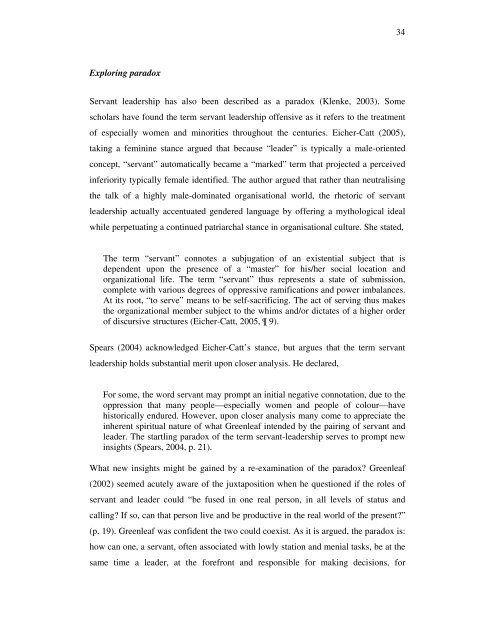nurturing servant leaders in religious education - Scholarly ...
nurturing servant leaders in religious education - Scholarly ...
nurturing servant leaders in religious education - Scholarly ...
Create successful ePaper yourself
Turn your PDF publications into a flip-book with our unique Google optimized e-Paper software.
Explor<strong>in</strong>g paradox<br />
Servant <strong>leaders</strong>hip has also been described as a paradox (Klenke, 2003). Some<br />
scholars have found the term <strong>servant</strong> <strong>leaders</strong>hip offensive as it refers to the treatment<br />
of especially women and m<strong>in</strong>orities throughout the centuries. Eicher-Catt (2005),<br />
tak<strong>in</strong>g a fem<strong>in</strong><strong>in</strong>e stance argued that because “leader” is typically a male-oriented<br />
concept, “<strong>servant</strong>” automatically became a “marked” term that projected a perceived<br />
<strong>in</strong>feriority typically female identified. The author argued that rather than neutralis<strong>in</strong>g<br />
the talk of a highly male-dom<strong>in</strong>ated organisational world, the rhetoric of <strong>servant</strong><br />
<strong>leaders</strong>hip actually accentuated gendered language by offer<strong>in</strong>g a mythological ideal<br />
while perpetuat<strong>in</strong>g a cont<strong>in</strong>ued patriarchal stance <strong>in</strong> organisational culture. She stated,<br />
The term “<strong>servant</strong>” connotes a subjugation of an existential subject that is<br />
dependent upon the presence of a “master” for his/her social location and<br />
organizational life. The term “<strong>servant</strong>” thus represents a state of submission,<br />
complete with various degrees of oppressive ramifications and power imbalances.<br />
At its root, “to serve” means to be self-sacrific<strong>in</strong>g. The act of serv<strong>in</strong>g thus makes<br />
the organizational member subject to the whims and/or dictates of a higher order<br />
of discursive structures (Eicher-Catt, 2005, ¶ 9).<br />
Spears (2004) acknowledged Eicher-Catt’s stance, but argues that the term <strong>servant</strong><br />
<strong>leaders</strong>hip holds substantial merit upon closer analysis. He declared,<br />
For some, the word <strong>servant</strong> may prompt an <strong>in</strong>itial negative connotation, due to the<br />
oppression that many people—especially women and people of colour—have<br />
historically endured. However, upon closer analysis many come to appreciate the<br />
<strong>in</strong>herent spiritual nature of what Greenleaf <strong>in</strong>tended by the pair<strong>in</strong>g of <strong>servant</strong> and<br />
leader. The startl<strong>in</strong>g paradox of the term <strong>servant</strong>-<strong>leaders</strong>hip serves to prompt new<br />
<strong>in</strong>sights (Spears, 2004, p. 21).<br />
What new <strong>in</strong>sights might be ga<strong>in</strong>ed by a re-exam<strong>in</strong>ation of the paradox? Greenleaf<br />
(2002) seemed acutely aware of the juxtaposition when he questioned if the roles of<br />
<strong>servant</strong> and leader could “be fused <strong>in</strong> one real person, <strong>in</strong> all levels of status and<br />
call<strong>in</strong>g? If so, can that person live and be productive <strong>in</strong> the real world of the present?”<br />
(p. 19). Greenleaf was confident the two could coexist. As it is argued, the paradox is:<br />
how can one, a <strong>servant</strong>, often associated with lowly station and menial tasks, be at the<br />
same time a leader, at the forefront and responsible for mak<strong>in</strong>g decisions, for<br />
34

















